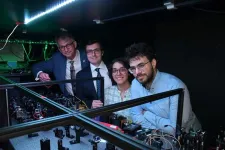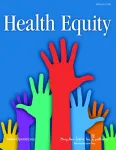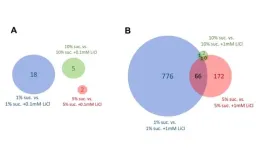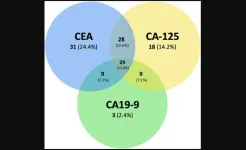(Press-News.org) What actually happens to the human body in space? While scientists and researchers have heavily researched how various factors impact the human body here on Earth, the amount of information available about changes that occur in the body in space is not as well-known. Scientists, including OHIO’s Nate Szewczyk and several of his trainees, have been studying for years how the body, specifically on the molecular side, changes in space. Recently, a new package of papers has been published in “Nature” journals depicting how the modern tools of molecular biology and precision medicine can help guide humanity into more challenging missions beyond where we’ve already been.
The package of papers, titled “Space Omics and Medical Atlas across orbits,” includes manuscripts, data, protocols, and code, representing the largest-ever compendium of data for aerospace medicine and space biology. Over 100 institutions from more than 25 countries worked together to coordinate the release of this molecular, cellular, physiological, phenotypic, and spaceflight data.
Szewczyk, a professor in the Department of Biomedical Sciences and a principle investigator in the Ohio Musculoskeletal and Neurologic Institute, coauthored seven different articles including: “Spaceflight induces changes in gene expression profiles linked to insulin and estrogen,” “Astronaut omics and the impact of space on the human body at scale,” “Understanding how space travel affects the female reproductive system,” “Transcriptomics analysis reveals molecular alterations underpinning spaceflight dermatology,” “Aging and putative frailty biomarkers are altered by spaceflight,” and “Ethical considerations for the age of non-governmental space exploration.”
In addition to coauthoring several papers, Szewczyk also involved his trainees on six of the papers. The trainees include OHIO medical students Anthony Carano and Caroline Coffey; Alexia Tasoula, a Ph.D. student in the translational biomedical sciences program; post-doctoral research Craig Willis, an OHIO alum and current assistant professor at the University of Bradford in the United Kingdom; as well as Dr. Henry Cope, researcher with the National Health Service in the United Kingdom.
Their articles highlight research from how spaceflight induced changes in insulin and estrogen signaling in rodents and humans, to ethical considerations for commercial spaceflight, and known and potential impacts of spaceflight on reproduction.
“We’ve studied worms for years but now have the ability to study people,” Szewczyk said. “We are at a place, particularly with NASA and the commercial sector, where we can focus on using more modern omics techniques to try and better understand changes in astronauts themselves, which can revolutionize their health.”
Szewczyk, known for his work researching worms in space, highlights the significance of these creatures as the first multicellular animals to have their genome sequenced. Leveraging genomics tools and techniques developed through worm studies, researchers have been able to delve into the molecular changes experienced by organisms in space. He notes that for over two decades, worms have been sent into space to observe gene expression alterations, paving the way for these similar studies in humans.
But as space flight becomes more commercialized and more people outside of just NASA’s astronauts pursue orbit, the need to understand the molecular level of humans in space becomes more important in ensuring their health and safety.
According to Szewczyk, the U.S. is growing in its space-based economy and as a result of that, there is now increased interest in commercial space flight. Even in Ohio there is a new space park in Columbus set up by the commercial company Voyager Space.
“The more commercial space flight grows, the more important understanding people’s omics is,” Szewczyk explained. “Space medicine is evolving from something that really only NASA was responsible for since they were the only organization sending people into space, to something more common as commercial space flight grows. We are seeing an increase in this type of flight from SpaceX and other companies and it is crucial that those entering space are prepared. Flight providers must provide medical coverage for their participants. When people go to the International Space Station (ISS), it is governed by certain rules and regulations, whereas with commercial space flight, these same guidelines don’t necessarily apply. There is interest to grow space medicine and advance techniques for looking at health in space, especially as more people are able to go into orbit.”
Szewczyk's impact extends far beyond the laboratory as he actively advocates for open science and international collaboration, particularly in the field of space research. As co-chair of the NASA GeneLab Animal Analysis Working Group, he promotes the sharing of scientific knowledge among international space agencies, exemplified by initiatives like integrating the European Space Agency and the Japanese Aerospace Exploration Agency (JAXA) into NASA working groups. Moreover, his involvement in a JAXA Flagship Project includes leading efforts to harmonize ethical concerns and research methodologies for precision health in astronauts across multiple space agencies, including NASA, ESA, and JAXA.
“Humans are humans regardless of where they are from or currently live and the way space impacts them is ultimately the same,” Szewczyk said. “So the more we can all work together to compare how astronauts and those visiting space react in space, the better we can work to ensure safety and determine what guidelines need put in place for their health while in space and returning.”
END
Guiding humanity beyond the moon: OHIO’s Nate Szewczyk and students coauthor papers published in “Nature” journals that revolutionize human space biology
2024-06-20
ELSE PRESS RELEASES FROM THIS DATE:
Grant supports research to identify barriers to health care for Black women
2024-06-20
A $1.58 million grant will support work by a health communication scholar at the University of Tennessee (UT) Health Science Center’s College of Nursing and a medical oncologist at West Cancer Center and Research Institute (WCCRI) to identify sociocultural and structural factors that are root causes of cancer health disparities for Black women in the Mid-South.
Assistant Professor Janeane Anderson, PhD, MPH, is a social scientist and health communication scholar at the College of Nursing whose research focuses on how interpersonal factors affect ...
Scientists at uOttawa develop innovative method to validate quantum photonics circuits performance
2024-06-20
A team of researchers from the University of Ottawa’s Nexus for Quantum Technologies Institute (NexQT), led by Dr. Francesco Di Colandreanorth_eastexternal link, under the supervision of Professor Ebrahim Karimi, associate professor of physics, has developed an innovative technique for evaluating the performance of quantum circuits. This significant advancement, recently published in the prestigious journal npj Quantum Information, represents a substantial leap forward in the field of quantum computing.
In the rapidly evolving landscape of quantum technologies, ...
New report on community-centered approach to providing vaccine education and resources to persons experiencing homelessness during COVID-19
2024-06-20
(Boston)— A community-support model for providing health resources and education is a way to continuously engage unhoused people and other underserved groups who are particularly vulnerable during health emergencies like the COVID-19 pandemic.
“Having a stable system for bringing health information to unhoused people and connecting them to providers at Boston Health Care for the Homeless Program (BHCHP), is a pathway for addressing a number of health issues they experience,” said Kareem King, Jr., research program manager at Boston University’s Clinical & Translational Science ...
Government updates race and ethnicity data collection standards: implications and insights
2024-06-20
New Rochelle, NY, June 20, 2024–The latest issue of the peer-reviewed journal Health Equity features a pivotal roundtable discussion titled “Implications and Insights on Federal Revisions to Race and Ethnicity Collection.” This roundtable assembles leading experts to explore newly revised race and ethnicity data collection standards from the Office of Management and Budget (OMB), highlighting the significant impact these changes have on policy and practice. The expanded standards now capture historically marginalized communities, ...
Dr. Vivek S. Kavadi named CEO of the American Society for Radiation Oncology (ASTRO)
2024-06-20
ARLINGTON, Va., June 20, 2024 — The American Society for Radiation Oncology (ASTRO) announced today that following a nationwide search, Vivek S. Kavadi, MD, MBA, FASTRO will become CEO of the Society effective November 1, 2024. Dr. Kavadi will succeed Laura Thevenot, who previously announced her intent to retire after leading the organization since 2002.
Dr. Kavadi, a radiation oncologist and ASTRO member since 1994, ascends to the role from his current position as Chief Radiation Oncology Officer for The ...
Dietary sucrose determines activity of lithium on gene expression and lifespan in drosophila melanogaster
2024-06-20
“[...] we found that, in female D. melanogaster, the life-prolonging effect of dietary lithium is dependent on the actual sucrose content of the medium.”
BUFFALO, NY- June 19, 2024 – A new research paper was published in Aging (listed by MEDLINE/PubMed as "Aging (Albany NY)" and "Aging-US" by Web of Science) Volume 16, Issue 11, entitled, “Dietary sucrose determines the regulatory activity of lithium on gene expression and lifespan in Drosophila melanogaster.”
The amount of dietary sugars and the administration of lithium both impact the lifespan of the fruit fly Drosophila melanogaster. It is noteworthy that lithium ...
Assessment of CEA, CA-125, and CA19-9 as adjuncts in non-small cell lung cancer management
2024-06-20
“[...] these inexpensive, widely available tests with rapid turnaround times and relatively short half-lives (CEA, CA-125, and CA19-9) are perfectly situated to serve as adjunctive clinical tools in the management of NSCLC.”
BUFFALO, NY- June 20, 2024 – A new research paper was published in Oncotarget's Volume 15 on June 13, 2024, entitled, “Assessment of serum tumor markers CEA, CA-125, and CA19-9 as adjuncts in non-small cell lung cancer management.”
Conventional tumor markers may serve as adjuncts in non-small cell lung cancer ...
Iron meteorites hint that our infant solar system was more doughnut than dartboard
2024-06-20
Key takeaways
Iron meteorites are remnants of the metallic cores of the earliest asteroids in our solar system. Iron meteorites contain refractory metals, such as iridium and platinum, that formed near the sun but were transported to the outer solar system.
New research shows that for this to have happened, the protoplanetary disk of our solar system had to have been doughnut-shaped because the refractory metals could not have crossed the large gaps in a target-shaped disk of concentric rings.
The paper suggests that the refractory metals moved outward ...
Anti-trust regulators should consider their options carefully when start-ups are acquired, new study suggests
2024-06-20
June 20, 2024
Anti-Trust Regulators Should Consider Their Options Carefully When Start-Ups are Acquired, New Study Suggests
Less Blunt Options than Banning Acquisitions May Help Preserve Innovation and Competition
Toronto - Promoting a competitive marketplace has been the main focus for regulators concerned with “killer acquisitions” -- when big companies swallow small startups to eliminate a potential rival.
But researchers and other observers point out that blocking these purchases puts something else important at risk – innovation. Startups are sometimes driven to come up with a new process or product precisely because ...
Family conditions may have more of an impact on upward social mobility than gender inequality
2024-06-20
Family conditions—specifically, how similar one’s social status and background is to one’s parents’ status—may play a bigger role in determining how easily an individual can shift into a wealthier socioeconomic class than gender inequality, according to a study of 153 countries published June 20, 2024 in the open-access journal PLOS ONE by Khanh Duong from Maynooth University, Ireland.
As global inequality increases, researchers have found that countries with higher levels of income inequality tend to experience lower rates of class mobility (in other words, individuals in a lower socioeconomic ...




